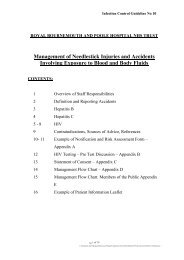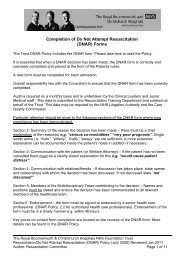View June's Board Pack - Royal Bournemouth Hospital
View June's Board Pack - Royal Bournemouth Hospital
View June's Board Pack - Royal Bournemouth Hospital
- No tags were found...
You also want an ePaper? Increase the reach of your titles
YUMPU automatically turns print PDFs into web optimized ePapers that Google loves.
Where next for the NHS reforms in England?There is evidence to suggest that approachesto integrated care work best when some of theresponsibilities for commissioning services are givento those responsible for delivery (Christensen et al2008). Giving providers freedom to take ‘make or buy’decisions means that the redesign of care and servicesis clinically led. Importantly, it promotes collectiveaccountability among providers for the quality, costs andoutcomes of care as incentives to integrate services arealigned and this approach becomes more culturally andsystematically embedded.We would also emphasise that integrated care does notappear to evolve as a natural response to emerging careneeds in any system of care whether this be planned ormarket-driven. Achieving the benefits of integrated carerequires strong system leadership, for example, frompolicy-makers and other system architects, to providea platform to support it. Systemic barriers to integratedcare in England must be addressed if patient-centredintegrated care is to become a reality. It is to this issuethat we now turn.The barriers to integrated care and theimplications of the proposed reformsThe NHS today contains many barriers to integratedcare. Examples of how they have been overcome, suchas those described in the previous section, are fewand far between. As a result, the NHS ranks poorlyin international comparisons examining patientcentredcare where surveys demonstrate comparativeweaknesses in its ability to support care co-ordination(Schoen et al 2008). What then are the main barriers todeveloping a new model of care?Organisational complexity and restructuringThe NHS in England is made up of a large number oforganisations, each with responsibility for differentaspects of commissioning and service provision. Theseorganisations include strategic health authorities,primary care trusts and NHS trusts (most of which arenow foundation trusts) responsible for acute services,specialist services, mental health services, communityservices, and ambulance services. Complexity has beenincreased by the move to enable NHS services to be runas social enterprises and by the encouragement givento independent sector and voluntary sector providersto deliver care to patients. Alongside the NHS, localauthorities are responsible for social care, on which manyof the most vulnerable users depend.As well as organisational complexity, the NHS has beenaffected by frequent restructuring. This has had theeffect of taking managers’ time and attention awayfrom the core business of improving patient care andaddressing weaknesses in performance. In some cases,restructuring has resulted in increased fragmentation.Examples include the separation of responsibility forcommissioning health care and providing services,introduced in 1991, and the requirement that primarycare trusts divest themselves of responsibility fordirectly providing services under the transformingcommunity services policy.The latter policy has resulted in increased integrationin areas where community services have been takenon by NHS trusts providing acute services and mentalhealth services. Paradoxically, in other areas, such asTorbay, progress in integrating care has been adverselyaffected by this policy, in part because of the instabilitycaused by restructuring, and in part because of therequirement that there should be a clear separationbetween commissioning and service provision in thecare trust. Similar challenges have been encountered inareas like the Cumbria, the Isle of Wight and Knowsleywhere the requirement that primary care trusts shoulddivest themselves of responsibility for directly providingservices has put barriers in the way of closer integration.The impact of the proposed reformsThe proposed reforms to the NHS could increaseorganisational complexity as encouragement is givento any willing provider to deliver care to patients andrenewed efforts are made to encourage NHS staff toestablish social enterprises. Also, the proposed abolitionof strategic health authorities and primary care trusts mayhelp in reducing the number and type of organisations inthe NHS, but it will also have the effect of removing thetwo bodies that have the potential to support partnershipworking and provide local system leadership. On the otherhand, the proposed health and wellbeing boards will havea duty to promote integrated care, although their powersto make this happen are weak under current plans.8 © The King’s Fund 2011
















